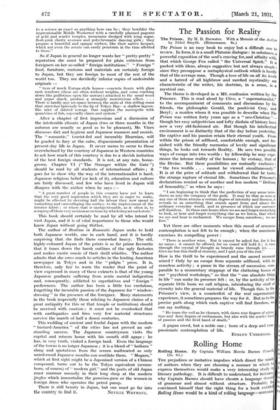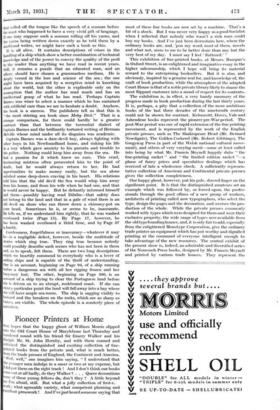Rolling Home
Rolling Home. 12s. 61.)
By Captain William Morris Barnes (Cassell,
THE prejudices or imitative impulses which direct the minds of authors when they are choosing a manner in which to express themselves would make a very interesting study in literary pathology. It is difficult to understand, for instance. why Captain Barnes should have ,chost'n a language devoid
of grammar and almost without structure. Probably convinced himself that the right thing for a book entitled
Rolling Home would-be a kind of rolling language=—sentenee4
that rolled off the tongue like the speech of a seaman before the mast who happened to have a very vivid gift of language. If one may suppose such a seaman rolling off his yarns, and the yarns being written down exactly as he told them by a shorthand writer, we might have such a book as this.
It is all alive.. It contains descriptions of crises in the handling of a ship which show a better combination of technical knowledge and of the power to convey the quality of the peril to the reader than anything we have read in recent years. Still, it remains a puzzle that an educated man, and an officer, should have chosen a_ grammarless medium. He is deeply versed in the lore and science of the sea ; the one might have been acquired by a receptive mind in knocking about the world, but the other is explicable only on the assumption that the author has read much and has an intellectual grasp of what he has read. Perhaps Captain Barnes was wiser to select a manner which he has sustained with artificial care than we are to hesitate a doubt. Anyhow, the book is a success. The publishers tell us that this is "the most stirring sea book since Moby Dick." That is a strange comparison, for there could hardly be a greater contrast than that between the torrential dialect of Captain Barnes and the brilliantly tortured writing of Herman Melville whose mind under all its disguises was academic. • Captain Barnes was a dare-devil boy, always fighting with other boys in • his Newfoundland home, and risking his life in a way which gave anxiety to his parents and. trouble to the police. Nothing could keep him away from the sea. He had a passion for it which knew no cure. This cruel, fascinating mistress often persecuted him to the point of death, but he would always return to her. He had opportunities to make money easily, but the sea alone satisfied some deep-down craving in his heart. His relations told him that the old devil the Sea would whip him away from his home, and from his wife when he had one, and that he would never be happy. But he defiantly informed himself and them—possibly having read Dibdin—that safety does not belong to the land and that in a gale of wind there is an old devil on shore who can throw down a chimney-pot on your head. Sometimes he is, or seems to be, inaccurate. He tells us, if we understand him rightly, that he was washed overboard twice (Page 15). By Page 17, however, he has been washed overboard a third time, and by Page 37 a fourth.
Carelessness, forgetfulness or inaccuracy—whatever it may be—is a negligible defect, however, beside the multitude of stories which ring true. They ring true because nobody could possibly describe such scenes who has not been in them and, so to speak, felt them. There are two long descriptions which we heartily commend to everybody who is a lover of sailing ships and is capable of the thrill of understanding. One is an account, beginning on Page 94, of a ship running before a dangerous sea with all her rigging frozen and her buoyancy lost. The other, beginning on Page 390, is an account of a ship trying to clear the Portuguese land before she is driven on to an abrupt, rockbound coast. If she can clear a particular point the land will fall away into a bay where she will have ample sea-room. The ship is sagging visibly to leeward and the breakers on the rocks, which are as sharp as knives, are visible. The whole episode is a masterly piece of narrative.



















































 Previous page
Previous page